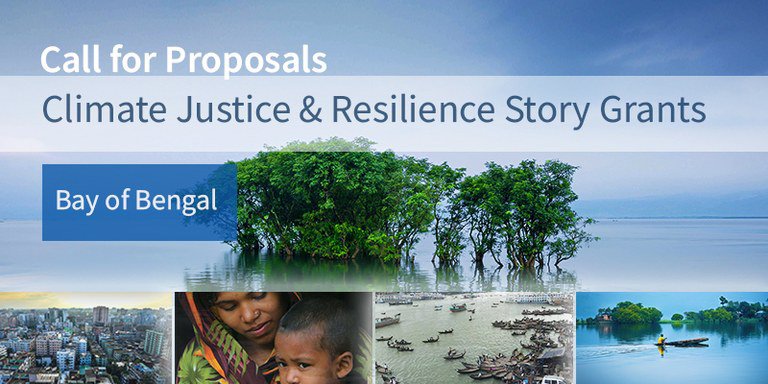
Deadline: MARCH 11, 2019 AT 5:30pm BST / 5:00pm IST
Internews’ Earth Journalism Network (EJN) is offering grants to journalists in the Indian and Bangladeshi regions of the Bay of Bengal to support in-depth stories on climate and environmental change that inform communities most vulnerable to a changing climate to make better decisions and build resistance.
The Bay of Bengal is widely recognized as one of the most vulnerable regions to the impacts of climate change. This vulnerability stems from both the wide variety of climate risks as well as the density and diversity of the roughly 400 million people who call it home.
In a warming world, communities in the low-lying coastal plains and river deltas increasingly find their lands eroded away by rising seas and their freshwater contaminated by saltwater intrusion. Further inland, droughts, floods and deadly heat waves threaten the health of vulnerable groups in addition to affecting the crops communities depend on for their livelihoods. With average global temperatures rising, these climate change effects will only grow more frequent and severe.
Yet people often experience these impacts unevenly. Gender, ethnicity, class and age all affect a person’s ability to respond to shocks and a community’s overall capacity to adapt. In the Bay of Bengal region, the people most vulnerable to the effects of climate change often lack representation in governments and major media outlets. They also face a shortage of access to quality information about climate change and ways in which they can mitigate and adapt to its impacts.
This grant aims to confront those challenges by supporting the production of in-depth stories on climate and environmental change that improve the quantity, quality and access to information among vulnerable coastal communities in the Bay of Bengal region. This information can help these at-risk communities make better decisions about their options in the face of a changing climate and give them tools to build their resilience.
The story grants are provided as part of EJN’s Bay of Bengal project, implemented by Internews with generous funding from the Climate Justice Resilience Fund.
TYPES OF STORIES
We’re seeking in-depth stories that focus on climate and environmental change, natural resource management or related issues, such as climate-induced migration, agricultural and water issues or food security in the Bay of Bengal region. We have a particular interest in the impact of these changes on women and other marginalized groups(including youth, indigenous people, ethnic minorities, people with disabilities) and their ability to adapt.
We encourage stories that report on potential solutions and address how vulnerable communities are responding to challenges. We are also highly interested in stories that utilize relevant data to illustrate the issue in a compelling and easy-to-understand way.
Finally, we are looking for stories with the potential to inform policy decisions by addressing domestic or transboundary environmental concerns, such as regional cooperation to tackle climate change. Particular attention should be given to the adaptation needs, challenges, efforts and success stories of vulnerable and marginalized communities.
For the purposes of this grant call, we are accepting applications that support socio-environmental reporting and climate resilience-building in the Bay of Bengal region – specifically, in the coastal regions of four Indian states (Tamil Nadu, Andhra Pradesh, Odisha, West Bengal), and coastal areas of Bangladesh.
WHO SHOULD APPLY?
Journalists (online, print, television, radio) with a track record of reporting on climate change, natural resource management and other environmental issues. We encourage applications from freelancers and staff from all types of media – international, national, local and community based.
Grantees have to publish or broadcast their stories in their affiliated media. EJN, its partners and the Climate Justice Resilience Fund shall have the right to edit, publish, broadcast and distribute these stories freely, once they have been published/broadcast in the original media outlet. Freelance reporters should demonstrate a plan for publication and provide a letter of interest from an editor.
STORY APPROACH AND FORMAT
EJN expects to award around 15 grants averaging $1,000 each depending on the proposal and reporting format. We will consider larger awards for in-depth stories using innovative or investigative approaches. Applicants should provide a detailed budget with justification for the amount requested using the template provided.
We expect that stories will be produced with equipment the applicant already has access to (including cameras, lighting, tripods, laptops etc.) and will not consider budgets that heavily focus on procuring new supplies. If the purchase of technical equipment is essential to the story, applicants should clearly state how the equipment can contribute to the expected outcomes and outputs.
We also encourage the use of multimedia and new or unique media platforms to present and share the stories. Applicants with ideas for long-form and multimedia narratives should include plans and budget for accompanying multimedia elements (i.e. video, photos) and distribution channels in their pitch.
Stories can be produced in English or local languages, or both. Applicants who intend to write or produce stories in local languages need to also include an English translation. Please include the cost for translation in the budget, if necessary.
Please also note on your budget form if you are receiving funding from other donors.
EXPECTED STORY LENGTHS
- Text-based stories: 1,000 to 3,000 words
- Photo stories: 10-20 images with descriptive captions and a short 200-400 word introduction
- Multimedia package: Text between 600 to 1,500 words with 2-4 minute video and/or graphics, photos and maps
- Broadcast: Video piece around 4-6 minutes in length with a short, roughly 200-word introduction
- Audio report/podcast: Feature of up to 20 minutes in length with short text to summarize the audio.
JUDGING CRITERIA
Applicants should consider the following points when devising their story proposals
- Timing: We expect the proposed story or stories to be published by 31 July 2019.
- Relevance: Does the proposal meet the criteria and objectives? Why does this story matter and to whom? Is the main idea, context and overall value to the target audience clearly defined?
- Angle: If the story has been covered by other media outlets, does your proposal bring new insights into the topic or offer a fresh angle?
- Impact:Does the proposal have a compelling narrative or investigative element that will inform and engage, draw attention, trigger debate and urge action?
- Innovative storytelling: The use of creative approaches and data visualization will be considered a plus.
- Feasibility. Can the story be realistically completed within the given time frame? Is the budget realistic?
- Diversity: We will take gender and geographical distribution into account when selecting the grantees in addition to the criteria above.
HOW TO APPLY
- Applicants should follow the link below and complete the form by the deadline.
- Each application will require a detailed budget proposal. You should follow this link and download and complete the budget form before beginning the application since you’ll be asked to attach it.
- In addition to answering the questions on the form, we ask that every applicant submit a resume/CV and three samples of your reporting.
- Please note: The website will inform you that your application has been submitted, you will not receive email confirmation. Applications submitted after the deadline time and date below will not be considered.
For enquiries:
For enquiries, please contact [email protected]


